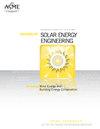Guidance on Evaluating the Performance of Multigeneration Systems Based on Energetic and Exergetic Criteria
IF 1.9
4区 工程技术
Q3 ENERGY & FUELS
Journal of Solar Energy Engineering-transactions of The Asme
Pub Date : 2023-04-20
DOI:10.1115/1.4062376
引用次数: 0
Abstract
This paper presents an investigation of the performance indices employed in combined or multigeneration thermal systems. Specifically, the following thermal systems will be considered: (1) combined cooling and power (CCP) systems; (2) combined heating and power (CHP) systems; and (3) combined cooling, heating, and power (CCHP) systems. The investigation will highlight the main problems and limitations related to using these indices. We will propose a new procedure for evaluating the performance of CCP systems that can be generalized for use in other combined or multigeneration systems. Employing the subsystems forming any multigeneration system as a reference, the relative saving ratios of energy and exergy are calculated. These saving ratios are used as metrics for the goodness of multigeneration systems. We will also use them to calculate equivalent energetic and exergetic efficiencies of multigeneration systems. These equivalent efficiencies will be used as performance indicators of a multigeneration system as if it were producing only one of its products. The new procedure will be applied to three case studies in this paper. Results of this work indicate that the equivalent exergetic efficiency of power generation is the most meaningful and accurate performance index for assessing the performance of multigeneration systems.基于能量和火用准则的多发电系统性能评价导则
本文对联合发电或多发电热力系统的性能指标进行了研究。具体而言,将考虑以下热力系统:(1)联合冷却和动力(CCP)系统;(2) 热电联产系统;以及(3)冷却、加热和动力(CCHP)组合系统。调查将强调与使用这些指数有关的主要问题和局限性。我们将提出一种评估CCP系统性能的新程序,该程序可推广用于其他联合或多代系统。以构成任意多代系统的子系统为参考,计算了能量和火用的相对节约率。这些储蓄率被用作衡量多代系统优度的指标。我们还将使用它们来计算多代系统的等效能量和运动效率。这些等效效率将被用作多代系统的性能指标,就好像它只生产一种产品一样。新程序将应用于本文的三个案例研究。这项工作的结果表明,等效发电效率是评估多代发电系统性能的最有意义和最准确的性能指标。
本文章由计算机程序翻译,如有差异,请以英文原文为准。
求助全文
约1分钟内获得全文
求助全文
来源期刊
CiteScore
5.00
自引率
26.10%
发文量
98
审稿时长
6.0 months
期刊介绍:
The Journal of Solar Energy Engineering - Including Wind Energy and Building Energy Conservation - publishes research papers that contain original work of permanent interest in all areas of solar energy and energy conservation, as well as discussions of policy and regulatory issues that affect renewable energy technologies and their implementation. Papers that do not include original work, but nonetheless present quality analysis or incremental improvements to past work may be published as Technical Briefs. Review papers are accepted but should be discussed with the Editor prior to submission. The Journal also publishes a section called Solar Scenery that features photographs or graphical displays of significant new installations or research facilities.

 求助内容:
求助内容: 应助结果提醒方式:
应助结果提醒方式:


